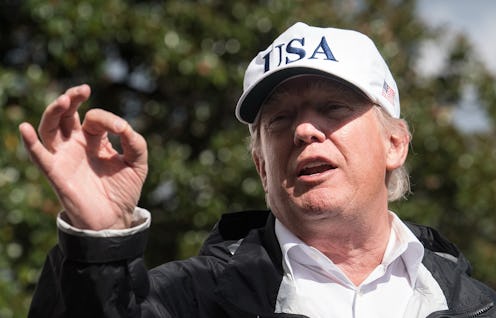News
All The Info You Need To Know About The "Nazi Bucket Challenge"

This week, the Trump administration dove headfirst into yet another caustic media feud, although this time it went even further than it often has in the past, actively calling for somebody be fired. Specifically, White House Press Secretary Sarah Huckabee Sanders said during her Thursday briefing that ESPN's Jemele Hill should be fired from the network for tweeting that President Donald Trump is a white supremacist. And now, social media is striking back: if you're wondering what the Nazi Bucket Challenge is, it doesn't actually involve any buckets.
The name, for starters, is an obvious reference to the mega-viral Ice Bucket Challenge that's swept social media in recent years, in which various people dump buckets full of ice water over their heads to raise awareness and money to combat amyotrophic lateral sclerosis (ALS), a fatal and incurable neurodegenerative muscular disease.
The Nazi Bucket Challenge, however, is raising awareness about something else altogether. It's a viral hashtag devoted to re-stating and amplifying the same claim about Trump that Hill got suspended from ESPN for making ― namely, that he's a white supremacist. There's no shortage of examples of Twitter users embracing the hashtag on Friday, with the format being a brief introduction and background, followed by the accusation of white supremacy.
Needless to say, Trump supporters are not pleased about the hashtag, with many prominent far-right Twitter users mocking and deriding it. But that doesn't seem to be dimming the enthusiasm from Trump's many critics, and the thrust of these charges of white supremacy are nothing new.
To the contrary, throughout the 2016 presidential campaign, he was widely condemned as racist and xenophobic by progressives, and even some conservatives.
For instance, thanks to his longstanding demagogic and scapegoating rhetoric about Mexican immigrants ― who he broad-brushed as "rapists" during his presidential announcement speech ― as well as his frequent derogatory and stereotyping comments about Muslims, insisting that Islam "hates us" and that the families of terrorists should be killed. That last statement, as many observers and critics pointed out at the time, was effectively a call for the American military to commit war crimes.
He also once infamously took out a full-page ad in multiple newspapers calling for the restoration of the death penalty, and the executions of the Central Park Five, a group of minority teenagers who were wrongfully convicted of a violent rape and assault. This was in 1989; the five teens were ultimately cleared by DNA evidence and had their convictions vacated in 2002. Trump, however, refused to acknowledge his error during the 2016 campaign, insisting he still believed them to be guilty.
And, of course, Trump's response to the deadly white supremacist violence in Charlottesville, Virginia last month only added fuel to the fire. Trump has repeatedly drawn equivalence between white supremacist and neo-Nazi demonstrators that descended on the city and the anti-racist counter-protesters who turned out to oppose them. One of the anti-racists, 32-year-old Heather Heyer, was killed in a vehicular attack, while many others were injured.
In short, the denizens of social media are not short on material with which to condemn Trump as a racist, even though the administration clearly doesn't appreciate the criticisms. He's also had one of the least popular young presidencies in American history, routinely polling at sub-40 percent approval since taking office on Jan. 20.
The White House has repeatedly denounced any suggestion that Trump is racist or white supremacist, and as previously mentioned, Sanders insisted during her Wednesday briefing that Hill should be fired by ESPN for suggesting such a thing. Specifically, she said that to call Trump a white supremacist was "one of the more outrageous comments that anyone could make."